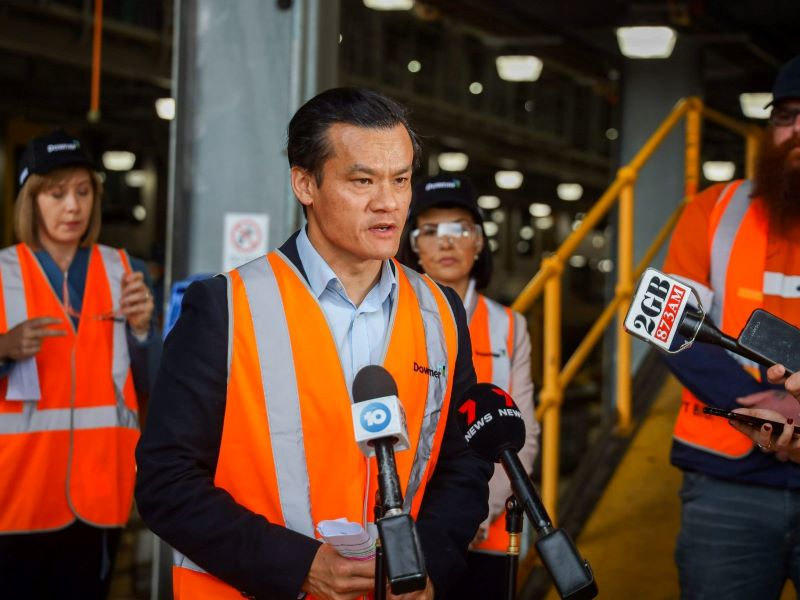New South Wales Labor would keep and enhance the existing government innovation and industry programs that are working if it wins this month’s state election, and is pledging to put the foot down on its own industry and manufacturing policies while building up a skills pipeline.
Weeks away from a state election that polls indicate would go to Labor, the shadow Industry and Finance minister Anoulack Chanthivong spoke with InnovationAus.com about what the new government’s approach to industry policy would be.
Mr Chanthivong said a state Labor government would not take an axe to the programs established by the current government, like a long term R&D plan, a shared use advanced manufacturing research facility, and government innovation challenges for small businesses.
But a Minns government would look to do its own “proper analysis” on areas of competitive advantage, overhaul procurement – including redefining ‘value for money’ considerations — and skill up a workforce for a more complex economy.

Mr Chanthivong said approaches to industry policy are changing around the world, including inside New South Wales Labor, but he will always work to a principle of “the public purse for the public good”.
“If it doesn’t meet that sort of central principle, then it’s probably not something we want to focus on,” he told InnovationAus.com.
Mr Chanthivong said the role of government in nurturing innovation and helping to translate it into industries, jobs and exports has also been underscored by the disruptions of the COVID-19 pandemic.
“I think national industry and national development manufacturing is the New Black. It’s an exciting time to be in industry policy. I’m hoping I get the opportunity to implement some of these great ideas that I’ve got and some of Labor’s suite of policies, which will I think, set up the New South Wales economy for the future.”
The state’s vulnerabilities have triggered a new push in New South Wales to turn research and development into jobs and shore up domestic capabilities.
But the pace has been too slow since the massive disruption of a global pandemic, and glacial before it, according to Mr Chanthivong.
He lays the blame at successive state Coalition governments which have “ignored” industry policy for more than a decade, costing capabilities and local jobs.
“Since this Liberal government came to office, New South Wales has lost about 49,000 manufacturing jobs in a decade. While at the same time in Queensland, they gained about 17,000 manufacturing jobs,” he said.
Last year the Perrottet government released an Industry Green paper to kick off consultations on a new industry policy to shape the next decade and is developing an additional Modern Manufacturing strategy.
Again, the pace is too slow for the Member for Macquarie Fields.
“It’s only taken them almost 12 years issue in industry white paper,” he said.
“So what happened in the previous 11 years? Industry policy didn’t exist, or industry policy didn’t matter?”
While critical of the pace of state industry policy, Mr Chanthivong does back the increasingly targeted approach of supporting certain areas of competitive advantage. He’s also on board with the federal government’s call to move up the value chain in traditionally strong resources.
“Rather than just dig them up and ship them out, we need to actually move further up the value chain to take advantage of our natural resources. That sort of industry where it’s much more high tech and will require a greater level of skill and training is what is what we’re after.”
On supporting research and development, Mr Chathivong wants to continue the “selective” approach, but flagged a new Labor government would want to do a “proper analysis” of industry challenges and opportunities.
He said the move to identify four key technology themes — Digital, materials and chemistry, biotechnology, and energy – was a “good start” but can’t be the end. He doesn’t want to miss opportunities in areas like defence, aerospace, robotics, or renewable energy and circular economy that might not fit neatly into the state R&D plan launched last year.
“We need to actually leverage off that and turn ideas into inventions, inventions into development and industry, industries into jobs, employment and future export opportunities.”
The Opposition is campaigning on manufacturing centres of excellence in Sydney, the Hunter and the Illawarra it says will train around 1000 apprentices a year in manufacturing skills and technologies.
It has also committed to reshoring rail manufacturing with minimum local content, overhauling procurement and establishing a Jobs First Commission – an “independent, expert body to oversee the growth of local industries and provide support for businesses to bid for Government tenders”.
Mr Chanthivong told InnovationAus.com his federal counterpart’s planned $15 billion National Reconstruction Fund is also a massive opportunity for New South Wales.
He has had conversations with federal Industry minister Ed Husic and Manufacturing minister Tim Ayres, eying potential investments in the state’s renewable energy push in particular.
“I think part of the NRF and working with the states is to ensure we use the public resources to de-risk some of the factors for industry and to help industry grow to a level where they can become independent and competitive on a global scale,” he said,
“And that’s what I think we should be heading towards.”
Do you know more? Contact James Riley via Email.

